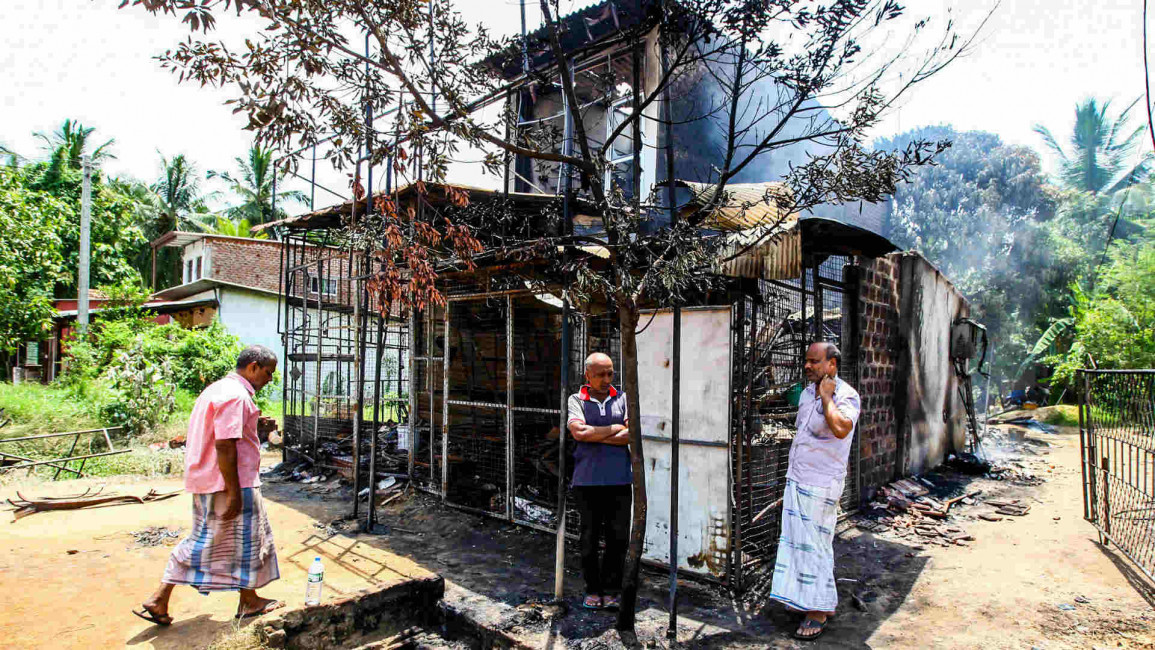Sri Lanka situation 'under control' after anti-Muslim riots
Sri Lankan authorities said Wednesday they had the situation "under control" after mosques and Muslim-owned shops and businesses were targeted in a violent backlash after the Easter Sunday terror attacks.
A second overnight curfew imposed nationwide ensured there was no repeat of Monday's violence against the Muslim minority, who make up some 10 percent of Sri Lanka's population of 21 million.
Many Muslims have been bracing for revenge attacks since three churches and three luxury hotels were bombed by local Islamist extremists on April 21, killing 258 people,
"The situation is now totally under control," said Military spokesman Sumith Atapattu. "There were no incidents of violence overnight and we are arresting groups of people responsible for taking part in mob attacks."
Ruwan Gunasekera, a police spokesman, said that more than 80 people were in custody as of Tuesday evening.
But Muslims in North-West Province remained nervous and stayed indoors Wednesday, after sword-wielding rioters killed one man late Monday while vandalising scores of shops and mosques.
In Bingiriya, where some 2,000 people went on the rampage, Muslim cleric M. I. M. Siddeeque said the community was worried.
|
"Our people are still afraid to go out," he told AFP by telephone.
Amnesty International have called on authorities in Sri Lanka to do more to protect Muslims.
"The authorities must take steps to promote unity in diversity against the forces of hatred, those promoting fear and violence, and pitting communities against each other."
Military spokesman Atapattu said security forces were arresting small groups of suspected trouble-makers and handing them over to police.
They were being held under emergency laws under which convicts can be jailed up to 10 years, police spokesman Gunasekera said.
Among those detained was Amith Weerasinghe, a man from Sri Lanka's majority Buddhist Sinhalese community and on bail for his role in similar riots in March last year in the central Kandy district.
Police had also ordered a shake-up of their leadership in the province after allegations of inaction to contain the unrest.
Parliamentary speaker Karu Jayasuriya condemned the violence and appealed for calm.
"The attacks on mosques, the burning of houses and shops, the attacks on innocent people cannot be condoned in any way," Jayasuriya said in a statement.
The attacks come during the Muslim holy fasting month of Ramadan.
A state of emergency has been in place since the bombings and security forces have been given sweeping powers to detain suspects.
Internet service providers said the telecoms regulator on Tuesday extended a social media ban to Twitter. Earlier, Facebook, WhatsApp, YouTube and Instagram had been blocked to prevent the spread of messages inciting violence.
Follow us on Twitter: @The_NewArab

![Members of the Algerian delegation threw roses into the Seine [Getty]](/sites/default/files/styles/image_212x120/public/2024-07/GettyImages-2162980872.jpg?h=199d8c1f&itok=PDhNyMBE)

![The Libyans were arrested at a farm in Mpumalanga province east of Johannesburg [Getty]](/sites/default/files/styles/image_330x185/public/2024-07/GettyImages-2162903568.jpg?h=199d8c1f&itok=4Qzg79i1)